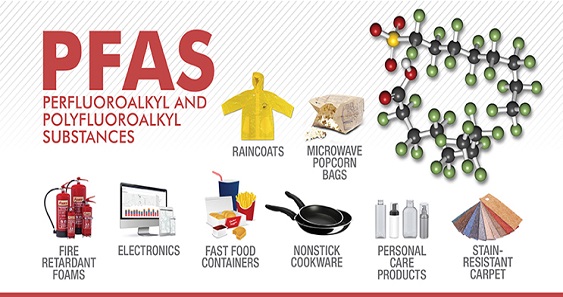ATL LIMS Support PFAS Testing
We’re hearing a lot of buzz from our users about an emerging challenge for the water/wastewater industry – per- and polyfluoroalkyl substances (PFAS) testing.
PFAS are man-made chemicals that have been used in industry and consumer products worldwide since the 1950s. They have been used to make nonstick cookware, water-repellent clothing, stain resistant fabrics and carpets, some cosmetics, some firefighting foams, and products that resist grease, water, and oil.
A recent review from the U.S. Centers for Disease Control and Prevention (CDC) outlines a host of health effects associated with PFAS exposure, including cancer, liver damage, decreased fertility, and increased risk of asthma and thyroid disease.
EPA Studies have shown:
- PFAS are widely used, long lasting chemicals, components of which break down very slowly over time.
- Because of their widespread use and their persistence in the environment, many PFAS are found in the blood of people and animals all over the world and are present at low levels in a variety of food products and in the environment.
- PFAS are found in water, air, fish, and soil at locations across the nation and the globe.
- Scientific studies have shown that exposure to some PFAS in the environment may be linked to harmful health effects in humans and animals.
- There are thousands of PFAS chemicals, and they are found in many different consumer, commercial, and industrial products. This makes it challenging to study and assess the potential human health and environmental risks.
EPA’s researchers and partners across the country are working to answer critical questions about PFAS. This information will help EPA and state, local, and tribal partners make more informed decisions on how best to protect human health and the environment. Studies include:
- How to better and more efficiently detect and measure PFAS in our air, water, soil, and fish and wildlife
- How much people are exposed to PFAS
- How harmful PFAS are to people and the environment
- How to remove PFAS from drinking water
- How to manage and dispose of PFAS
Click here to view the EPA’s PFAS Roadmap, with goals to Research, Restrict, Remediate.
ATL water quality users can manage and analyze all of their PFAS data in either Sample Master® or TITAN® LIMS and, with parsers, automatically import analytical data for faster turnaround times and higher data integrity. With ATL’s iMobile, field collectors can enter water quality data for samples collected in the field, sending it to the LIMS in real time. And with the secure data portal, Result Point®, clients have 24/7 data access to check on sample status, view reports, and search for historical data. For clients that outsource PFAS testing, unique templates can automatically import contract laboratory data into the LIMS for review and reporting. ATL’s LIMS also integrate with SAS JMP software for advanced statistical and AI analysis.
Many drinking water facilities will begin PFAS testing shortly due to new requirements by their States to test every well and any other source of water. The EPA limit for drinking water is 2-3 ng/l (nanogram per liter). The EPA has updated unregulated contaminant Monitoring Rule #5 for sampling of PFAS for 29 compounds to take effect next year.
The water industry can count on ATL’s LIMS to manage and report PFAS data, achieving compliance and protecting public health.
Is PFAS testing a concern for your lab? Tell us your story in the comments.
Submit this Form to Subscribe To Our Blog.
By pressing subscribe I agree to receive information about content, events, products, services and promotions from ATL. I agree for ATL to contact me by email to inform me of events, products, services and/or promotions offered. I can withdraw my consent and unsubscribe at any time by emailing info@atlab.com. By submitting my data, I give consent to the collection, processing and use of my personal data in accordance with the ATL Privacy Policy (atlab.com/privacy/).

0 Comments